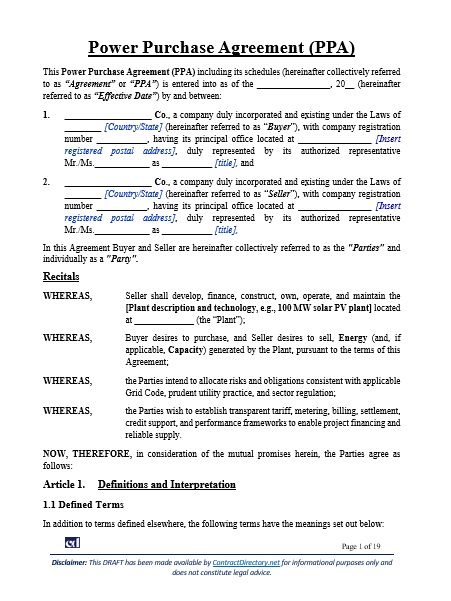Estimated reading time: 3 minutes
Defining the Power Purchase Agreement
A Power Purchase Agreement (PPA) is a long-term contract between a power producer and a buyer. It defines the sale of electricity, including capacity, energy, and related services. The purpose of such an agreement is to allocate risks clearly, ensure a reliable supply, and provide financial certainty to both parties. Therefore, it is an essential document for energy projects and their financing.

Commercial and Financial Terms
A PPA contract sets the contract duration, milestones, and commercial operation date. It establishes the tariff structure, usually comprising capacity charges, energy charges, and adjustment mechanisms. Payment terms, billing cycles, and indexation provisions ensure accurate and fair compensation. By providing transparency, the PPA enables lenders and investors to support energy projects confidently.
Risk Allocation and Obligations
The agreement allocates risks between seller and buyer. The seller undertakes to construct, operate, and maintain the plant. The buyer commits to purchase electricity and maintain payment security. Provisions address force majeure, curtailment, and deemed energy. Change in law clauses safeguard the parties against regulatory or tax changes. These elements ensure bankability and long-term stability.
Legal and Protective Provisions
A Power Purchase Agreement (PPA) contains strong legal protections to maintain balance. Default and termination clauses protect both parties against non-performance. Confidentiality provisions preserve commercial data. Assignment and change of control terms regulate ownership changes. Governing law and arbitration clauses establish enforceability. Together, these provisions ensure that the PPA remains a reliable framework throughout its duration.
Check out other similar issues:
- Build-Own-Operate Agreement (B.O.O)
- Build-Own-Operate-Transfer Agreement (B.O.O.T.)
- Build Operate Transfer Agreement (B.O.T)
- Offtake Agreement
Glossary of Key PPA Terms
- Commercial Operation Date (COD)
- The critical milestone when the power plant has completed all testing and is legally authorized to begin delivering electricity to the buyer for payment.
- Capacity Charge vs. Energy Charge
- The dual-tariff structure where the buyer pays for the plant’s availability (Capacity) and the actual electricity delivered (Energy), ensuring fixed cost recovery for the producer.
- Deemed Energy
- Electricity that could have been produced and delivered but was not, due to buyer-side constraints or grid curtailment, for which the buyer must still compensate the seller.
- Curtailment Risk
- The risk that the grid operator or buyer reduces the plant’s output below its potential, often requiring specific contractual “take-or-pay” or compensation protections.
- Bankability Provisions
- Specific clauses (such as step-in rights and long-term payment security) that make the PPA acceptable as collateral for international lenders and project financiers.
References
- McGrady Clarke – Power Purchase Agreements (PPAs): a practical guide – This guide provides an overview of Power Purchase Agreements, including their structure, key terms, and practical considerations for buyers and sellers in the energy sector.
- The Lawsplain – Explaining Power Purchase Agreements – The article breaks down how PPAs function, their essential components, and their role in modern energy markets.
- ENGIE Impact – How To Evaluate Power Purchase Agreement Risks – This insight discusses strategies for assessing and managing risks associated with renewable energy Power Purchase Agreements. …
has been added to your cart!
have been added to your cart!



